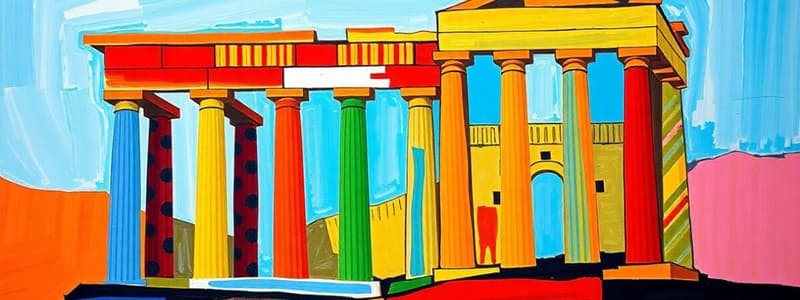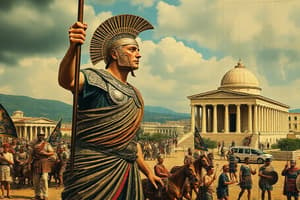Podcast
Questions and Answers
Who was a key leader in Athens during their golden age?
Who was a key leader in Athens during their golden age?
- Pericles (correct)
- Socrates
- Solon
- Homer
The agora served as the arena for athletic competitions in Athens.
The agora served as the arena for athletic competitions in Athens.
False (B)
What was the Parthenon?
What was the Parthenon?
A temple on the acropolis of Athens.
___ wrote the Iliad and the Odyssey.
___ wrote the Iliad and the Odyssey.
Match the works with their authors:
Match the works with their authors:
What was the primary focus of Sparta compared to Athens?
What was the primary focus of Sparta compared to Athens?
Women and non-citizens had the right to vote in ancient Athens.
Women and non-citizens had the right to vote in ancient Athens.
Who improved the economy of Athens and clashed with the nobles?
Who improved the economy of Athens and clashed with the nobles?
Draco is known for creating the __________ Law Code.
Draco is known for creating the __________ Law Code.
Match the archons with their contributions:
Match the archons with their contributions:
Which political unit was a characteristic of Greek society?
Which political unit was a characteristic of Greek society?
Athens and Sparta remained allies throughout their history.
Athens and Sparta remained allies throughout their history.
What limited the citizenship in ancient Greece?
What limited the citizenship in ancient Greece?
Which geographical feature most significantly helped protect ancient Greek civilization from attacks?
Which geographical feature most significantly helped protect ancient Greek civilization from attacks?
The climate in ancient Greece was predominantly harsh and cold.
The climate in ancient Greece was predominantly harsh and cold.
What type of government allows everyone to have a say in decision-making?
What type of government allows everyone to have a say in decision-making?
Greek mythology primarily focuses on explaining the ______ and human actions.
Greek mythology primarily focuses on explaining the ______ and human actions.
Which of the following bodies of water surrounds ancient Greece?
Which of the following bodies of water surrounds ancient Greece?
Match the form of government with its description:
Match the form of government with its description:
In Greek culture, the religion practiced was monotheistic.
In Greek culture, the religion practiced was monotheistic.
How did the mountainous terrain impact the political structure of ancient Greece?
How did the mountainous terrain impact the political structure of ancient Greece?
Which city-state is associated with a strong navy?
Which city-state is associated with a strong navy?
Sparta had a trade-based economy.
Sparta had a trade-based economy.
Name the alliance formed by Athens after the Persian War.
Name the alliance formed by Athens after the Persian War.
The __________ League was led by Sparta.
The __________ League was led by Sparta.
Which battle was a significant victory for the Greeks during the Persian War?
Which battle was a significant victory for the Greeks during the Persian War?
The Peloponnesian War began due to tensions between Athens and Sparta.
The Peloponnesian War began due to tensions between Athens and Sparta.
Match the following events with their significance:
Match the following events with their significance:
What happened after the Peloponnesian War?
What happened after the Peloponnesian War?
Who is known as the 'Father of History'?
Who is known as the 'Father of History'?
Thucydides wrote about the Peloponnesian War.
Thucydides wrote about the Peloponnesian War.
What did Archimedes contribute to science?
What did Archimedes contribute to science?
The three styles of columns in ancient architecture are Doric, Ionic, and __________.
The three styles of columns in ancient architecture are Doric, Ionic, and __________.
Match the following philosophers with their contributions:
Match the following philosophers with their contributions:
Which of the following scientists is associated with the Hippocratic Oath?
Which of the following scientists is associated with the Hippocratic Oath?
Phillip II of Macedonia conquered Greece before the Peloponnesian War.
Phillip II of Macedonia conquered Greece before the Peloponnesian War.
What theorem is Pythagoras famously known for?
What theorem is Pythagoras famously known for?
Flashcards
Greek Terrain
Greek Terrain
The rough landscape created natural barriers, protecting the Greeks from outside threats and limiting travel within Greece.
Greek Mythology
Greek Mythology
Ancient Greeks used mythology to explain events and natural phenomena, leading to a polytheistic (multiple gods) belief system.
Monarchy
Monarchy
A form of government where one person rules by birthright or tradition. Often passed down within families.
Tyranny
Tyranny
Signup and view all the flashcards
Oligarchy (Aristocracy)
Oligarchy (Aristocracy)
Signup and view all the flashcards
Democracy
Democracy
Signup and view all the flashcards
Greek Seas
Greek Seas
Signup and view all the flashcards
Greek Climate
Greek Climate
Signup and view all the flashcards
What was the agora?
What was the agora?
Signup and view all the flashcards
What was the Acropolis?
What was the Acropolis?
Signup and view all the flashcards
Who was Pericles?
Who was Pericles?
Signup and view all the flashcards
Who was Sophocles?
Who was Sophocles?
Signup and view all the flashcards
Who was Homer?
Who was Homer?
Signup and view all the flashcards
Polis
Polis
Signup and view all the flashcards
Draconian Law
Draconian Law
Signup and view all the flashcards
Solon
Solon
Signup and view all the flashcards
Peisistratus
Peisistratus
Signup and view all the flashcards
Cleisthenes
Cleisthenes
Signup and view all the flashcards
Athenian Citizenship
Athenian Citizenship
Signup and view all the flashcards
Sparta vs. Athens
Sparta vs. Athens
Signup and view all the flashcards
Athenian and Spartan Strengths
Athenian and Spartan Strengths
Signup and view all the flashcards
Sparta vs. Athens: Geography
Sparta vs. Athens: Geography
Signup and view all the flashcards
Sparta vs. Athens: Economy
Sparta vs. Athens: Economy
Signup and view all the flashcards
Sparta vs. Athens: Military
Sparta vs. Athens: Military
Signup and view all the flashcards
When did the Persian War happen?
When did the Persian War happen?
Signup and view all the flashcards
What were some key battles of the Persian War?
What were some key battles of the Persian War?
Signup and view all the flashcards
Golden Age of Athens
Golden Age of Athens
Signup and view all the flashcards
Alliances after the Persian War
Alliances after the Persian War
Signup and view all the flashcards
Peloponnesian War
Peloponnesian War
Signup and view all the flashcards
Who is Herodotus?
Who is Herodotus?
Signup and view all the flashcards
What makes Thucydides special?
What makes Thucydides special?
Signup and view all the flashcards
What are three main architectural styles of the ancient Greeks?
What are three main architectural styles of the ancient Greeks?
Signup and view all the flashcards
Who was Archimedes?
Who was Archimedes?
Signup and view all the flashcards
Who is Hippocrates known for?
Who is Hippocrates known for?
Signup and view all the flashcards
Who was Euclid?
Who was Euclid?
Signup and view all the flashcards
Who was Pythagoras?
Who was Pythagoras?
Signup and view all the flashcards
Name three influential Greek philosophers.
Name three influential Greek philosophers.
Signup and view all the flashcards
Study Notes
Ancient Greece Study Guide
-
Geographic Features of Greece: Mountains and water surrounding the peninsula prevented attacks and facilitated trade via water routes. Mild climate supported settlement.
-
Greek City-States' Disunity: The mountainous terrain isolated city-states, leading to political isolation and preventing unification.
-
Major Gods and Goddesses: Greek mythology included important deities like Zeus, Hera, Poseidon, Hades, Athena, and Apollo, each with significant roles and influence.
-
Tyrants of Athens: Draco (Harsh Law Code), Solon (Council of 500, debt relief), and Peisistratus (economic improvements, clashed with nobles), and Cleisthenes (transition to democracy) played pivotal roles. Early goals and accomplishments/failures are detailed in the text.
-
Athenian Political Power: Adult male citizens held political power and could vote. Women and non-citizens were excluded.
-
Greek Mythology and Religion: Greek mythology explained the unexplainable, human actions, and natural phenomena. Their religion was polytheistic.
-
Stages of Athenian Government: Monarchy, Tyranny, Oligarchy/Aristocracy, and Democracy are the 4 stages mentioned. Specific aspects of each form of governance are described in the text.
-
Meaning of Polis: The polis (city-state) was the primary political unit, with a high degree of loyalty.
-
Sparta vs. Athens (Comparing): Both were independent, had limited citizenship, assemblies, military strength, and fought against Persia.
-
Sparta vs. Athens (Differences): Sparta prioritized military training and Athens intellectual development. Sparta was in the Peloponnese valley, Athens on a mountainous coastline, and their economic philosophies differed (agriculture vs trade).
-
Persian War: The text provides timeline information; The Persians' motives and actions, and victors of key battles are listed.
-
Effects of the Persian War on Athens: The war allowed Athens to rebuild and enter a Golden Age.
-
Peloponnesian War: The Delian League (Athens) vs Peloponnesian League (Sparta). The Peloponnesian League won.
-
Pericles: A key leader in Golden Age of Athens. The text highlights his importance.
-
Golden Age of Pericles (period): Timeline and accomplishments.
-
Acropolis and Agora: The Acropolis and agora were the center of Athens- a marketplace and a hub.
-
Important Figures and their Contributions: The text details figures like Aeschylus, Sophocles, Homer, Phidias, Archimedes, Hippocrates, Euclid, Pythagoras, Socrates, Plato, Aristotle and Alexander the Great, mentioning their achievements, works, and importance.
-
Alexander the Great and Hellenistic Age: His empire's extent, impact on the spread of Greek culture, and characteristics of the Hellenistic civilization period.
Studying That Suits You
Use AI to generate personalized quizzes and flashcards to suit your learning preferences.



